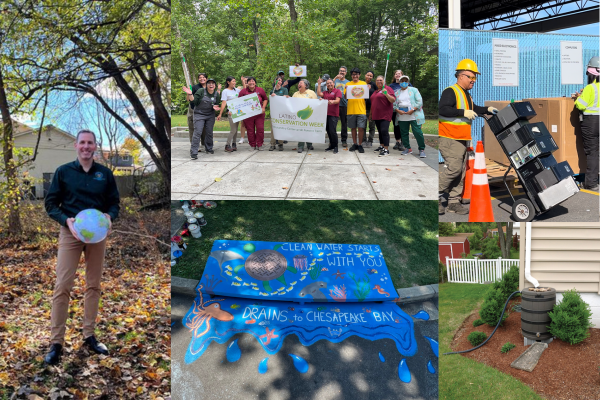Our Mission
Enhance the quality of life in our community
by protecting and improving Montgomery County's
air, water, and land in a sustainable, innovative,
inclusive, and industry-leading way while
fostering smart growth, a thriving more sustainable economy and healthy communities.

Our Director

Jon Monger serves as Director of the Department of Environmental Protection.
As Director his role is to lead the department’s mission to protect and enhance the quality of life in our community by protecting and improving Montgomery County's air, water, and land.
Previously, Monger served as Assistant Deputy Administrator at the United States Environmental Protection Agency, overseeing critical aspects of agency policy, management, and operational priorities.
In 2010, Monger served as Counsel for the Presidential Commission Investigating the Deepwater Horizon oil spill. He has also served as a policy advisor in the EPA's Office of Transportation and Air Quality and as an Oversight Counsel to the U.S. House of Representatives Committee on Energy and Commerce.
Divisions
Office of the Director
Director
-
Leads initiatives towards zero waste
-
Leads initiatives towards reducing greenhouse gases
-
Leads initiatives towards clean water
-
External and internal communication regarding DEP accomplishments, people, and initiatives
-
Develops strategic initiatives and partnerships leading to improved business opportunities and lower operating costs for DEP
Deputy Director
-
Responsible for overall management of daily operations
-
Ensures positive organizational culture and workplace environment
-
Safe operations and strong safety culture
-
Manages budget, rate setting, and revenue management
-
Integrates procurement and budget for capital and non-capital programs
-
Manages strategic initiatives related to procurement, IT, Human capital, and business process improvements
Communications and Public Engagement Section
-
Integration of external messaging and communication about DEP
-
Development of partnerships with community and advocacy groups, faith-based institutions, and the business community
-
Manages DEP branding guidelines
-
Evaluates effectiveness of internal and external communications
-
Manage Green Business Certification program
Energy, Climate and Compliance Division
-
Manage programs for Compliance with the County’s environmental laws
-
Manage process to assist building owners with compliance with Energy Benchmarking law
-
Provide leadership for County’s actions leading towards zero greenhouse gas emissions
-
Manages residential energy programs to assist county residents with energy efficiency
Recycling and Resource Management Division
-
Manages the County’s operations for collection and processing of recyclable materials for all single-family homes
-
Manages the Transfer Station which receives municipal solid waste from around the county
-
Manages the Resource Recovery Facility which provides for disposal of the county’s municipal solid waste
-
Manages composting operations and production of LeafGro
-
Manages initiatives to improve recycling in the county
Strategic Services Division
-
Manages DEPs performance metrics
-
Manages program assessment activities including business process improvements
-
Manages IT initiatives for DEP
-
Generates the Water Quality Protection Charge revenue and rate
-
Provides IT and management and strategic services to implement capital and non-capital programs
Watershed Restoration Division
-
Monitors water quality and assesses condition of streams
-
Inspects an maintains stormwater facilities
-
Coordination of the County’s Municipal Separate Storm Sewer Systems (MS4) Permit
-
Manages Capital Projects program for stormwater management
-
Manages RainScapes program
-
Manages Tree Montgomery program
-
Manages Organic Lawn Care program
-
Manages Pet Waste, Litter Reduction, and Community Grant programs
Learn About Us
DEP 2024 Year in Review
Montgomery County's Department of Environmental Protection's (DEP) 2024 Year in Review showcases a year of dedication, progress and environmental stewardship, and highlights the department's initiatives, achievements and community engagement from the past year.
Whether it's managing the county’s trash and recycling, transitioning homes and businesses to cleaner energy, or protecting our waterways - our department is dedicated to enhancing the quality of life in our community by safeguarding our air, water, and land.
See DEP's 2024 highlights below or watch the 2024 DEP Year in Review on YouTube.
Renewable Energy Milestones
The County continues to make progress toward our ambitious climate goals to cut greenhouse gas emissions 80% by 2027 and 100% by 2035 and adapt to our changing climate. We are doing this by helping people make the switch to electric at home and on the road.
- Launched the Healthy, Efficient, Electrified, Climate-Adapted Pilot grant program, providing $1.5 million in grants to community partners for pre-weatherization, electrification and climate adaptation projects in low- and moderate-income residential properties.
- Received a $150,000 State grant to retrofit diesel-powered food truck generators with electric powered systems, drastically cutting carbon emissions and improving public health.
- Promoted the Capital Area Solar Switch program, using group-buying power to offer quality solar system installation at a lower price. In 2024, more than 1,600 Montgomery County households registered for the program.
Waste Reduction and Recycling Success
In 2024, we expanded our efforts to Aim for Zero Waste launching Food Scraps Recycling Drop-Off sites at local farmers markets, expanding the Single-Family Residential Curbside Food Scraps Recycling Pilot Program and adding more items for recycling at the transfer station. The more we can recycle, the less we throw in the trash.
- Initiated Food Scraps Recycling drop off program at local farmers markets. An estimated 27,000 pounds of food scraps have been collected from approximately 3,800 residents.
- Expanded Single-Family Residential Curbside Food Scraps Recycling Pilot Program recycling over one million pounds of food scraps by more than 1,500 households.
- Expanded materials accepted for recycling including textiles and plastic wrap, and more types of electronics, batteries and durable medical equipment.
- Hosted 270 educational waste reduction and recycling event engaging over 22,000 residents.
Protecting and Preserving the Watershed
Working with communities is an important part of protecting our watersheds. Throughout 2024, we strengthened community engagement and ensure that our Watershed Restoration's public-facing programs are inclusive of all people and communities in the County.
- Awarded nearly one million dollars in grants to local nonprofit organizations for water quality improvement projects such as rain gardens, community cleanups and education on native plants.
- RainScapes awarded more than 1,800 rebates to County residents and businesses that participated in the program and celebrated 17 years of service.
- Tree Montgomery planted more than 4,000 trees, and 1,400 trees on Montgomery County Public School grounds.
Our Values
The Department of Environmental Protection's core values drive our mission:
- Accountability: We take responsibility for our decisions and actions and the quality of our work at DEP. We admit to mistakes, correct them, learn from them, and carry on. We ensure taxpayer dollars are spent wisely to protect the environment.
- Commitment: We strive for success and we follow through on our actions as promised. We care about our workforce, our community, and the environment and we use the best science and other knowledge as we work to improve the environment. We work to improve the quality of our services and we work together across DEP divisions to get the job done.
- Customer Service: We serve the people who live, work, and play in Montgomery County. We listen to our customers (including our co-workers), and we make a positive difference in their lives by providing accurate, timely help in a friendly manner. We communicate clearly on the services offered and assist the public with all the tools we have available to the best of our abilities.
- Diversity, Equity and Inclusion: Just as we value the diversity of the species around us, we commit to giving voice to the diversity of our human experiences. We create a welcoming environment where everyone is valued, respected, heard and matters. We pledge to celebrate the plurality of languages, nationalities, races, religions, sexualities, genders, and (dis)abilities in our community, and engage historically underrepresented members in the creation and enforcement of policies and programs to provide equitable protection to clean land, air, and water, and habitable climate under the law.
- Integrity: We are honest, fair, humble, and we uphold the highest ethical standards in all actions. We are trustworthy and we hold true to our ethical principles and stand up for what is in the best interest of the community, even (especially) when it is the difficult thing to do. We don't play favorites, we do our work, and we provide factual guidance.
- Leadership and Action: We are at the forefront of shaping a better future. We advance DEP’s mission and take action based on passion, respect, responsibility and commitment to working with, and for the community. We set goals and follow through to completion, creating positive outcomes for the environment and showing results through our work. We lead by example and we inspire others to do good for our communities.
Racial Equity Vision Statement
DEP's Racial Equity Vision Statement is to apply a racial equity lens when setting policies, projects, and programs related to DEP's Mission, ensuring the inclusion of diverse groups, especially frontline/underrepresented communities:
- Racial equity lens: A racial equity lens is the set of questions we ask ourselves throughout the decision-making process. The lens interrupts the impact of unintended consequences by taking into consideration the lived experiences and perspectives of the racially diverse communities we intend to serve.
- Frontline/Underrepresented Groups: Describes a group of people whose members are disadvantaged and subjected to unequal treatment by the dominant group, and who may regard themselves as recipients of collective discrimination.
Operating Budget
| Operating Budget by Fund | Amount in U.S. Dollars |
|---|---|
| Recycling and Resource Management | $142,650,993 |
| Water Quality Protection | $33,929,975 |
| General Fund | $9,083,847 |
| Total FY24 Budget: | $185,664,815 |
Organizational Chart

Performance and Results
DEP's Performance Plan lists each of DEP's Headline Performance Measures and identifies how well the Department is achieving results through succinct analysis highlighting contributing factors, limiting factors, and ways DEP aims to improve its performance. It also outlines the Department's operational efficiency.
-
Amount of Pollutant Removed Through the Watershed Restoration Program
-
Average Number of Days to Resolve Incoming Environmental Complaints
-
Percent Satisfied with DEP's Response to Environmental Complaints
-
Average Visits to DEP Websites
-
Total Solid Waste Generated in the County
-
Tons of Total Municipal Solid Waste Recycled
-
Missed Collection (Refuse and Recycling) Complaints per Week
-
Percent of Businesses in Compliance with Recycling Reporting
-
Single-Family Solid Waste Charges
-
Percent of Commercial Buildings in Compliance with Benchmark Laws
 Watch the DEP 2024 Year in Review Video on Youtube
Watch the DEP 2024 Year in Review Video on Youtube